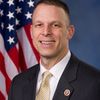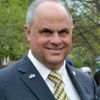Brian Allen
Elections and appointments
Education
Personal
Contact
Brian Allen (Republican Party) ran for election to the U.S. House to represent Pennsylvania's 10th Congressional District. He did not appear on the ballot for the Republican primary on May 17, 2022.
Allen completed Ballotpedia's Candidate Connection survey in 2021. Click here to read the survey answers.
Biography
Brian Allen was born in Kendallville, Indiana. He earned a bachelor's degree from Hillsdale College in 2002 and a Ph.D. from the Indiana University of Pennsylvania in 2008. His professional experience includes working as an associate professor of pediatrics and psychiatry at the Penn State College of Medicine, as director of mental health services at the Center for the Protection of Children, and as a licensed psychologist at Penn State Children's Hospital.[1]
Elections
2022
See also: Pennsylvania's 10th Congressional District election, 2022
General election
Democratic primary election
Republican primary election
Withdrawn or disqualified candidates
2022
Ballotpedia survey responses
See also: Ballotpedia's Candidate Connection
Brian Allen completed Ballotpedia's Candidate Connection survey in 2021. The survey questions appear in bold and are followed by Allen's responses.
Expand all | Collapse all
Brian is the son of a steelworker father and a factory worker mother who taught him the values of hard work and determination, and he became the first member of his family to graduate from college. He was born and raised in a small farm town and attended Hillsdale College, where he studied history and psychology along with topics such as political economy and the Constitution. He then attended Indiana University of Pennsylvania where he earned his doctorate in clinical psychology, specializing in the treatment of abused and neglected children. After establishing himself as a prolific researcher and a skilled clinician, the Penn State Children's Hospital asked him to establish a state-of-the-art treatment program for maltreated children. The program he built from scratch is now an internationally recognized leader in the fight against child abuse. He is currently an Associate Professor of Pediatrics in the Penn State College of Medicine. Brian has worked with children, adults, and families impacted by abuse and neglect, the opioid epidemic, mental illness, domestic and community violence, medical crises, and poverty. Along the way he has worked effectively with people across the political spectrum and garnered the respect of individuals from all walks of life.
- It is time to bring back a Republican Party that believes in the hope and promise of America's future, that promotes our policies without the fear and outrage.
- Conservative principles should guide policy decisions, not the dictates of party bosses. Among these principles are fiscal responsibility, limited government and personal responsibility, the rule of law, and promoting the cohesiveness of the family.
- We are an increasingly diverse society, and America belongs to all Americans, regardless of any personal characteristic. People of all backgrounds are welcome in our campaign and their voices will be heard.
Brian has three primary policy directives:
1. Reform our mental health care system. The COVID-19 pandemic and the opioid epidemic have clearly exposed our current mental health care system's level of brokenness. As a leading psychologist and researcher, Brian has an intimate knowledge of the mental health care system and how it can be reformed to improve the quality of services, increase accessibility for underserved areas, and enhance cost effectiveness.
2. A budget-neutral maternal leave program for new mothers. The United States is one of the few countries in the world that does not have a national law requiring paid maternity leave for new mothers. If we as the Republican Party want to be a party that promotes family values, this is a great place to start. Numerous examples clearly show the benefits of maternal leave to both the new mothers and their employers.
3. Enhance access to preventive healthcare measures. It is generally accepted that preventing illness is considerably more cost effective than treating disease once it occurs. In addition, prevention measures increase the likelihood of successful treatment once disease is discovered. We have numerous prevention programs demonstrated to improve health and reduce healthcare utilization, but they are not widely implemented. By enhancing access to these programs we can promote the health of our population, improve survival and recovery rates, and drive down healthcare costs. One of the figures from our history that I find most instructive is George Washington, but not for the same reasons as most others. Yes, he was the first president and the commander-in-chief of the Continental Army that won our independence, but his personal traits are those that we should expect our leaders to emulate. For example, Washington was acutely aware that he was not nearly as educated as his contemporaries (such as Thomas Jefferson or John Adams) and he knew that his appointment to head the Continental Army was largely political. In short, he knew his weaknesses and it kept him humble. He also knew his strengths, including courage and discipline. One of the most instructive stories from the War of Independence was Washington ordering his officers to place a white card in the back of their hats; officers should be leading soldiers into battle and the card would allow the men behind to know who the officers were. Washington himself was often out in front of a charge himself, inspiring his men. Because of his awareness of personal strengths and weaknesses, Washington was a true leader.
There is an increasingly lack of politicians in Washington who display the characteristics I believe are important for an elected official. We need people who are principled and have the courage to stand on those principles even if it is unpopular with party bosses. We need people who value the evolution of knowledge in fields such as science and economics and who use these new discoveries to make informed decisions, instead of dismissing them because the results are inconvenient. We need people who recognize our rich history, both our successes and our failures, and understand how it guides us to a more promising future, instead of denying those aspects of our past that are politically unpopular. We need people who will answer difficult questions with straight answers, instead of complaining about fairness and "fake news." We need people who are responsible to their constituents, who spend more time communicating with the people of their districts than lobbyists and donors. We need people who care about our country and citizens more than they care about press coverage and their own career advancement. Not finding any suitable Republican candidates in the 10th district that fit this description, I decided to run myself and I pledge to exhibit all of these qualities every day that I am in office.
Elected officials, by virtue of their position, can be leaders in our communities. They are capable of bringing attention to the needs of the district, advocating for the district in Washington, and bringing together those within our communities to plot a better way forward. Unfortunately, many of our elected members of Congress view their job as being in Washington. If elected, I will be visible in the community. I will meet with groups from across the political spectrum, provide a level of transparency unheard of for members of Congress, and be accessible to the people of the district. Town halls, interactive social media sessions, and other public events will be regular occurrences. I will answer difficult questions with honest answers and constituents will hear my thoughts on a given matter, not crafted talking points from party leadership. When my term in office is over, people will know that I went to work every day to improve our community. While we may not always agree, they will know their voices were heard and they had an advocate in Washington.
In was born and raised in a small farm town and job opportunities were scarce. When I was 15, one of the two local grocery stores hired me as a "jack-of-all-trades" employee. I stocked shelves, worked a register, bagged groceries, and carried groceries out to people's cars (this was a long time ago). It was a great part-time job for a teenager that taught hard work and how to interact with people.
This one is also difficult. I don't really have a favorite because I learn different things from reading different books, mostly histories and biographies. I recently finished reading a biography of Ulysses S. Grant by Ron Chernow, which gave me a new appreciation for this man, his successes, and his struggles. The last book I finished was the "Rape of Nanking" by Iris Chang that chronicled the atrocities committed against the Chinese people during World War II. I would recommend to anyone interested in American history to read "A Leap in the Dark" by John Ferling, which is the best work I have seen on the formation of the early American republic and the struggles of developing our new nation during its infancy.
Chewbacca. He's armed with a crossbow that fires lasers. You don't really need any other reason.
This is difficult to answer, but probably some current pop song that my two young daughters made me listen to. If I had it my way, songs that were stuck in my head would be limited to Zac Brown Band, Jimmy Buffett, and Bob Seger.
The greatest challenge facing our nation is the division and animosity rampant among the population. We have come to a point where civil discourse and debate is no longer tolerated. Someone with contrasting viewpoints is viewed as the enemy and their motivations are suspect. Not only does this attitude tear at the fabric of our Republic, it undermines the very nature of a government that is based on the rule of law and the democratic election of leaders. We can come together, we can return to a place where we can passionately disagree with someone without demeaning them, and we can find common ground that leads us all to a better place.
It is appropriate that the term length for a representative in the House is two years, but we need to also have term limits that will prevent a ruling elite from dominating our nation's government for decades. Representatives in the House should be limited to five terms (10 years) and senators should be limited to two terms (12 years). I support a Constitutional amendment to place term limits on members of Congress.
There is not just one story, but many. In my current position I work everyday with people who are struggling, whether it be due to the effect of substances, or poverty, or domestic violence, or sexual abuse, or any number of other life circumstances. Through it all, most retain hope that there will be a better day in the future. I've seen many of them overcome their challenges and succeed in the face of adversity. I know it is possible, and I know there are things that we can do better as a society to increase the number of people who become productive and contributing members of our community.
My daughters tell me all of my jokes are "dad jokes," but here goes. Why does a milking stool only have three legs? Because the cow has the udder.
Note: Ballotpedia reserves the right to edit Candidate Connection survey responses. Any edits made by Ballotpedia will be clearly marked with [brackets] for the public. If the candidate disagrees with an edit, he or she may request the full removal of the survey response from Ballotpedia.org. Ballotpedia does not edit or correct typographical errors unless the candidate's campaign requests it.
See also
External links
- ↑ Information submitted to Ballotpedia through the Candidate Connection survey on June 27, 2021
Senators
Representatives
Republican Party (11)
Democratic Party (8)



 = candidate completed the Ballotpedia Candidate Connection survey.
= candidate completed the Ballotpedia Candidate Connection survey.



 = candidate completed the Ballotpedia Candidate Connection survey.
= candidate completed the Ballotpedia Candidate Connection survey.
 = candidate completed the Ballotpedia Candidate Connection survey.
= candidate completed the Ballotpedia Candidate Connection survey.









